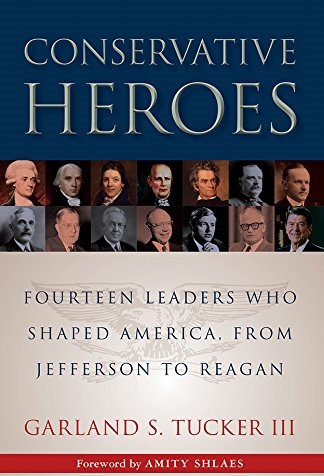By Rushad L. Thomas and Samuel Izzo
In his 1950 work The Liberal Imagination literary critic Lionel Trilling celebrated the triumphal march of liberalism in American society. He exclaimed with pride that “Liberalism is not only the dominant but even the sole intellectual tradition…nowadays there are no conservative or reactionary ideas in general circulation.” In a final deposition of conservatism, Trilling declared the philosophy to be nothing more than the expression of “irritable mental gestures which seek to resemble ideas.”
Trilling’s unflattering portrayal confronts a masterful reprove in Garland S. Tucker’s new work Conservative Heroes: Fourteen Leaders Who Shaped America, From Jefferson to Reagan. In this book, Tucker provides snapshots of several important men, many long-since forgotten, whose words and work laid the foundations of modern American conservatism, a philosophy that, Trilling’s denunciation notwithstanding, remains an active and potent force on the American political landscape.
In addition to greats such as James Madison and William F. Buckley, Conservative Heroes will also introduce the reader to important figures obscured by the distance of history. He describes men such as Robert A. Taft, son of the president, who rose to prominence as Senate Majority Leader in the mid-1940s, and fashioned the Congressional Republicans into what Tucker calls “a cohesive, conservative force” pushing back against the excesses of the Roosevelt and Truman Administrations. He also resurrects Josiah Bailey, a Democratic Senator from North Carolina, who in 1937 fashioned a Conservative Manifesto akin to the 1994 Contract with America. Bailey’s manifesto countered the policies of Franklin Roosevelt’s New Deal.
The most controversial aspect of Conservative Heroes undoubtedly lies in its defense of figures such as John C. Calhoun, the antebellum statesman from South Carolina, Nathaniel Bacon, and John Randolph, slavery apologists whom Tucker describes as having “employed their considerable gifts in defense of an ignoble cause.” Yet he also shows how the conservative principles of the nineteenth century were not simply based on prejudice and stubbornness, but on well-reasoned philosophical foundations rooted in the old Republican virtue of limited government.
Undoubtedly, the most impressive hero Tucker illuminates is the 30th President of the United States, Calvin Coolidge. Tucker recounts the central errand of Coolidge’s presidency, reducing the Federal tax burden on the American people. In this effort, which Coolidge undertook as a moral crusade, the President had a worthy partner in Treasury Secretary Andrew Mellon. A rather idiosyncratic pair (it was once said that they “conversed entirely in pauses”), Coolidge and Mellon pursued a campaign that eventually lowered the top marginal tax rate to 25 percent, a rate to which it has never descended since. This experiment with what Mellon described as “Scientific Taxation” led to an increase in Federal receipts, and allowed Coolidge to pay down a third of the national debt and reduce the Federal budget by 35 percent. These actions precipitated what became known as the “Coolidge Prosperity,” with rock-bottom levels of unemployment, massive economic growth, and millions of Americans rising to the Middle Class.

In a brief 200 pages Tucker provides an indispensable primer on the impressive history of the conservative intellectual tradition in America. Clear and fascinating, Conservative Heroes should feature prominently in the collections of all who want to better acquaint themselves with the history of American conservatism in action.